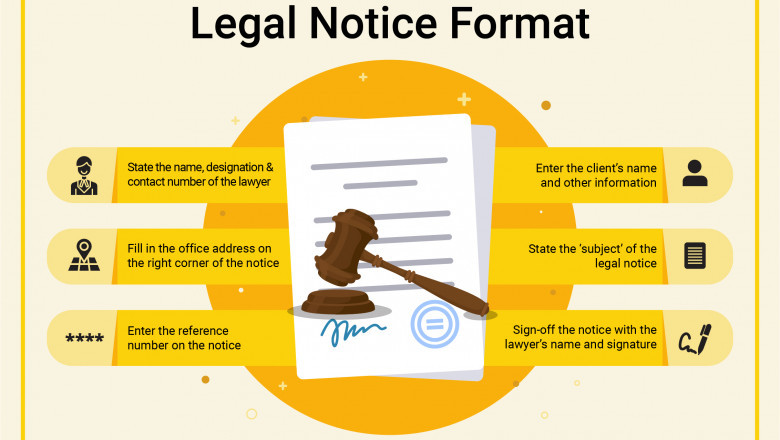views

You have provided services to a client, but you haven’t been paid yet. What do you do? A legal notice to recover money may be the solution you are looking for. This document is designed to inform your client about your outstanding invoices and give them time to pay before taking further action. It also informs your client that if they don’t pay you within a set number of days, you will initiate legal action against them. It’s an effective strategy because it puts pressure on your clients and makes them aware that they need to pay or face the consequences. If you’re in this unfortunate situation, here is how you can write a legal notice to recover money and begin the collection process as quickly as possible..
What Is a Legal Notice to Recover Money?
A legal notice to recover money is a document that you send to your client when you have delivered services that they have not paid for. This notice will typically contain the following information: - The amount that the client owes you and when they are expected to pay it. - Information about the legal action that you will take if the client ignores the notice. - Information about your client’s right to dispute the debt, if they believe they don’t owe you anything.
Before You Write Your Legal Notice
Before you send a legal notice to recover money, you should carefully consider the following factors. - Have you done a thorough job of tracking your hours and creating invoices? - Is there any way that your client might be able to dispute the amount that you are asking for? If so, you might want to settle for less money. - Who is your client? If they are a business, you might want to consider bringing in a collection agency to handle the legal notice for you. - If your client is a person, are they likely to ignore the legal notice and not pay you?
Content of a Legal Notice to Recover Money
A legal notice to recover money should contain all of the following information. - The date of the notice. - The name and contact information of your business or the individual who is sending the notice. - A detailed description of the services that you agreed to do and the date when they were completed. - A detailed description of the outstanding invoice and the amount that the client owes you. - A clear statement of the consequences of ignoring the notice.
How to Serve a Legal Notice to Recover Money
If your client is a business, you can send the legal notice to the company’s registered agent. If the client is an individual, you can send the notice to their residence address. If you send the notice to the client’s place of business and they don’t acknowledge it, the notice is considered served. If you send the notice to the client’s residence, the notice is considered served 10 days after the date on the notice.
Taking Action After Sending a Legal Notice to Recover Money
If your client ignores your legal notice, you should consider taking the following actions. - Send a Final Notice: When a client ignores your legal notice, you should send a final notice that informs them that legal action will be taken soon unless they pay you. You can include a final invoice with this notice to make it clear that they need to pay. - File a Small Claims Suit: If your client ignores both the final notice and the legal notice, you will have to file a small claims suit against them. This will move the dispute out of the informal realm and into the formal court system. - Hire a Debt Collection Attorney: If your client owes you a large amount of money and you are having a hard time collecting it on your own, you might want to hire a debt collection attorney to help you out. Debt collection attorneys often work on a contingency basis, which means that they don’t get paid unless they collect money for you. - Consider a Bad Credit Report: In some cases, you may want to consider reporting your client to a credit bureau if they don’t pay you. This will damage their credit, but it might provide you with the incentive you need to collect the money that you are owed.
Final Words: Writing a legal notice is only the first step
Writing a legal notice to recover money is something that almost every business owner will at some point have to do. However, it isn’t something that you can do once and then forget about. You should periodically check to make sure that the client hasn’t paid off their account, and you should be prepared to follow up with legal action if necessary. If you want to collect the money that you are owed, make sure to send a legal notice to your client. The client has the opportunity to dispute the debt, but if they don’t respond to your notice and don’t pay you, you can take legal action.












